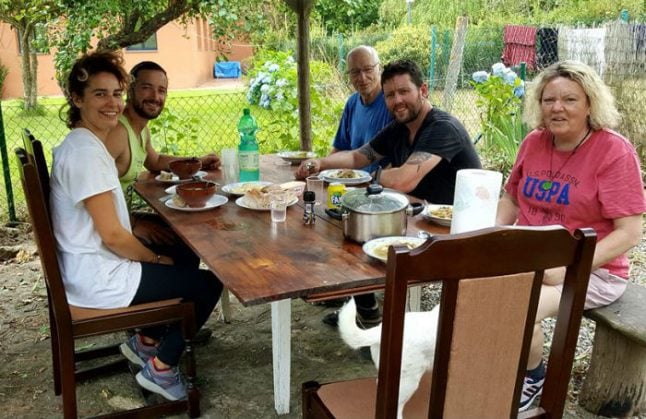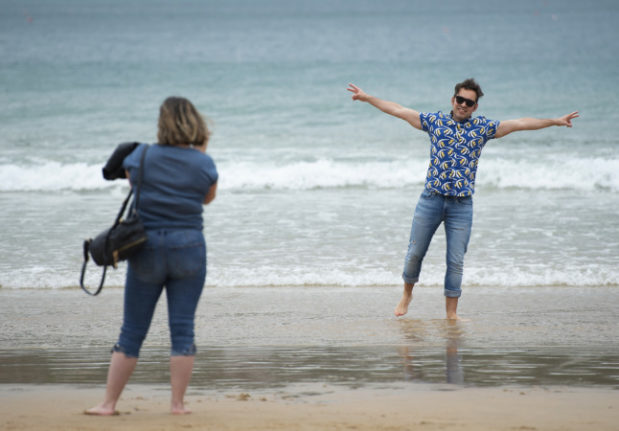Workaway is one of the best-known online communities where people can post profiles, and match up with each other as either a host or a volunteer worker. Our Air B&B hosts put us onto it when we stayed with them in May 2018, while purchasing our new house. Volunteers provide labour, for up to five hours per day, and hosts feed and house the volunteers. A really great idea! Many people travel the world this way.
Our neighbours here in Panton have all used this means of obtaining much-needed help; with house renovations, and work on their land. We registered as hosts before we moved to Panton, because it seemed like a lovely way to meet interesting people who had useful skills we needed, which ranged from teaching us some Spanish and translating documents, to hard landscaping and demolition.
We arrived on the 12th July 2018, and welcomed Antoinne and Maude-Helene into our new home on the 15th. They were a lively, talented, French-Canadian couple, in their mid- twenties, who were keen to see the “real” Galicia. We gave them the best room upstairs, and made it as homely as we could for them. Our cat, Minnie, newly arrived herself, and still cranky from a week in transit by air from Australia, was less welcoming; she deposited a giant hairball on their bed the first night, which poor Maude-Helene mistook for a dead mouse! Minnie was instantly banished from visiting the second floor.
Our new friends worked hard in the summer sun. They helped us to clear decades of dusty, overgrown ivy and wisteria from our house and garden.
They dismantled a wrecked poly-tunnel, and pulled down a spider-infested, rotten pergola roof; leaving more time for me and Sarah to project-manage the building renovations, and find our way around suppliers. We had to learn quickly where to purchase the best/cheapest building materials, and who would deliver free.
Eager to follow local custom, we would gather our whole team each day for lunch under the (re-roofed!) pergola on our terrace. I kept everyone happy with huge pots of pasta, thick soups, garden salads and home-made bread and cakes – such a change from our usual hurried, “grabbed” sandwich, eaten at desks, when we were office slaves! Travel stories, tales of ex-pat mis-haps and eccentricities, and local lore kept us all entertained and forged friendships we still value. I was suddenly in my element again; cooking for a crowd.
Years of conferences, meetings and teaching sessions kept me from my true vocation. Making lunch became a true labour of love, and I threw myself into creating outstanding food for our workers each day – food they all still talk about! I will be sharing some of these recipes, as I work on my first book, celebrating the beautiful local produce we are so blessed with here in Green Galicia.
Heath's Almond and Coconut Cake with Raspberries (Gluten-Free)

Ingredients
- 1 1/2 cups (170g) almond meal
- 1 1/4 cups (275g) caster sugar
- 3/4 cup (70g) desiccated coconut (lightly toasted)
- 4 eggs
- 2 tsp vanilla extract
- 200g butter, melted and cooled
- 1/2 cup (55g) fresh or frozen raspberries.
Method
- Preheat oven to 180°C (350°F), lightly grease a 24cm springform pan and line the base and sides with baking paper.
- In a large bowl, stir together almond meal, sugar, and coconut.
- In a separate bowl, whisk the eggs and vanilla extract until well combined. Slowly whisk in the melted butter.
- Add the butter mixture into the almond mixture, stirring until smooth. Gently fold in half of the raspberries.
- Pour the cake batter into the prepared tin, then dot the top with the remaining raspberries. Sprinkle the top of the cake with approx. 1 tbsp. of sugar.
- Bake 50-55 minutes, until the cake is golden and the top springs back when you press it lightly. Or an inserted skewer comes out clean.
- Cool the cake in pan for 5 minutes, then transfer it to a wire rack to cool completely.
If you are feeling flush and lavish, bake two cakes, and when cooled, slice the top of one (bonus for the cook!) to level it, then sandwich the two cakes together with a thick layer of lemon butter-cream.
READ HEATH'S FIRST COLUMN HERE:



 Please whitelist us to continue reading.
Please whitelist us to continue reading.
Member comments